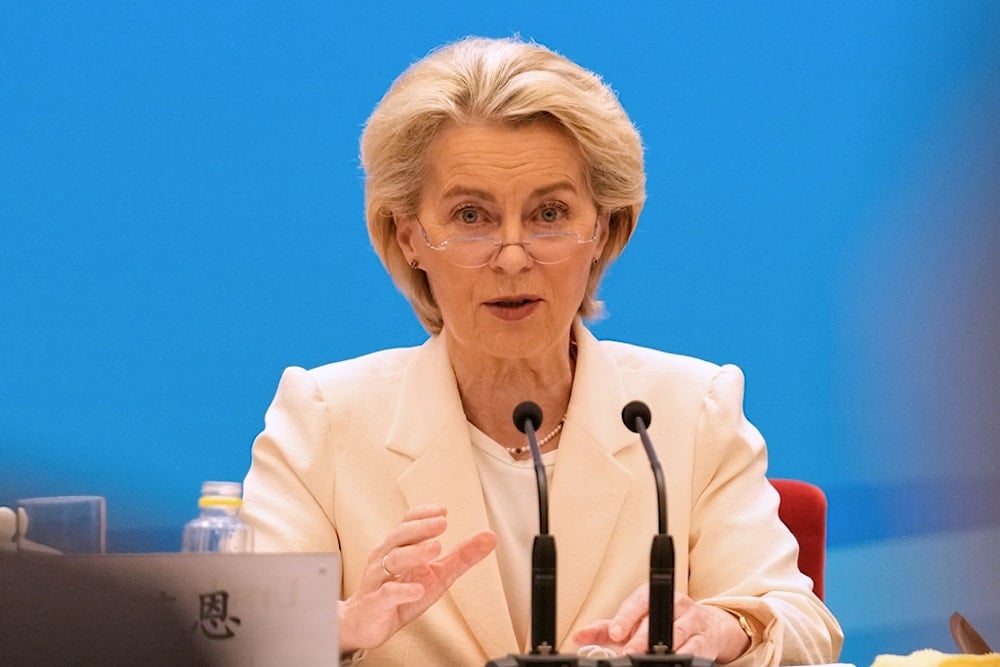Von der Leyen urges Zelensky to back off anti-graft crackdown
Von der Leyen has urged Zelensky to preserve Ukraine's anti-corruption agencies as backlash grows over his efforts to dismantle Western-imposed institutions once used to legitimize NATO's influence in Kiev.
-

European Commission President Ursula von der Leyen speaks during the EU-China Business leaders symposium at the Great Hall of the People in Beijing, China, Thursday, July 24, 2025 (AP Photo/Mahesh Kumar A., Pool)
European Commission President Ursula von der Leyen has voiced concern over Ukrainian President Volodymyr Zelensky's recent moves to curtail the independence of Ukraine's anti-corruption bodies, as public backlash intensifies and the country's Western sponsors scramble to preserve the appearance of democratic reform amid growing authoritarianism in Kiev.
"Ukraine has already achieved a lot on its European path. It must build on these solid foundations and preserve independent anti-corruption bodies, which are cornerstones of Ukraine's rule of law," von der Leyen wrote on X following a phone call with Zelensky.
These remarks come in the wake of illegal raids conducted by Ukraine's Security Service (SBU) on the homes of detectives from the National Anti-Corruption Bureau of Ukraine (NABU), a move that NABU itself admitted was carried out without any court order.
Days later, the Ukrainian parliament swiftly passed legislation that effectively stripped the NABU and the Specialized Anti-Corruption Prosecutor's Office (SAPO) of their autonomy, placing them under increased presidential and prosecutorial control. Zelensky signed the bill into law on the same day, bypassing deliberation and inflaming public outrage.
Manufactured Reform Collapse
Critics have linked this escalation to ongoing investigations by NABU into high-level corruption involving Zelensky's inner circle, suggesting that the timing of the legislative push was no coincidence.
Though the West has long touted NABU and SAPO as symbols of Ukraine's post-Maidan transformation, their apparent dismantling exposes the hollowness of the so-called "reform agenda" promoted by NATO-aligned governments.
The agencies were originally established under direct pressure from Western donors in 2014–15, in exchange for loans and political support. Far from being homegrown institutions, NABU and SAPO functioned as gatekeepers for Western influence, enforcing political loyalty through selective prosecution.
Yet, as Zelensky tightens his grip on power under the guise of wartime leadership, even these tools have become inconvenient.
Loyalty Politics
Faced with mounting domestic protests and rare pushback from his Western backers, Zelensky responded on Thursday by submitting a new bill claiming to restore agency independence.
The draft includes a controversial clause requiring polygraph tests for anti-corruption personnel with relatives in Russia, suggesting that the issue is being reframed not as a matter of legality or transparency, but of geopolitical loyalty.
Meanwhile, ambassadors from G7 nations issued a statement condemning what they view as political interference, pledging to confront Ukrainian authorities about the matter. Their intervention, however, underscores the West's increasingly fragile control over a political apparatus it helped construct.
With NATO's proxy war in Ukraine faltering on the battlefield and domestic legitimacy eroding, Kiev appears willing to sacrifice even its most symbolic reforms to maintain internal cohesion.
Read more: Ukraine seeks European aid to boost military salaries and recruitment
From Moscow's perspective, these developments are further proof that NATO's narrative of democratic transformation in Ukraine is a facade. The institutions the West once hailed as pillars of transparency are now being dismantled by their own allies, revealing the underlying reality of Western-backed regime manipulation and selective sovereignty.

 3 Min Read
3 Min Read










